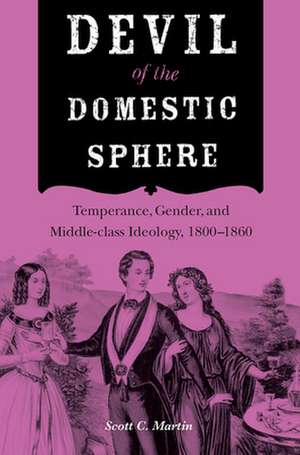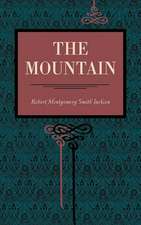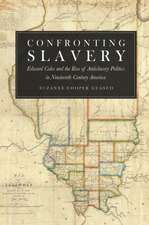Devil of the Domestic Sphere: Temperance, Gender, and Middle-class Ideology, 1800-1860
Autor Scott C. Martinen Limba Engleză Paperback – 27 mai 2010
Drink, in the minds of antebellum temperance reformers, represented the threat of an increasingly urban, industrial world. Contrasting the drunkards’ lack of restraint with their own thrift and sobriety, these members of the emerging middle class lay claim to respectability, virtue, and moral leadership. As they sought to legitimate their own authority, reformers also employed temperance literature to propagate middle-class ideas about the nature of women and their role as guardians of the home.
Stories of women as innocent victims and loving saviors filled temperance literature. Ministers, novelists, and journalists portrayed wives beaten by drunken husbands; poets and songwriters extolled mothers and sisters who rescued men from demon drink. Yet a strand of misogyny also ran through temperance ideology. Denunciation of women as causes of intemperance and snares for men, and celebration of women’s victimization often coexisted with a more positive assessment of women’s role in the emerging middle class. Unless a woman remained vigilant, she too might succumb to drink, and reformers had very little sympathy for such a fallen angel.
By examining the contradictory images of women employed by the antebellum temperance movement, Scott Martin reveals the reformers’ commitment not only to social betterment but also to middle-class interests and a particular gender ideology. Martin explores the reasons why more men than women drank, the ways in which society dealt with women who neglected familial and social obligations to become drunkards, and the consequences of women’s failure to eradicate male drunkenness.
Stories of women as innocent victims and loving saviors filled temperance literature. Ministers, novelists, and journalists portrayed wives beaten by drunken husbands; poets and songwriters extolled mothers and sisters who rescued men from demon drink. Yet a strand of misogyny also ran through temperance ideology. Denunciation of women as causes of intemperance and snares for men, and celebration of women’s victimization often coexisted with a more positive assessment of women’s role in the emerging middle class. Unless a woman remained vigilant, she too might succumb to drink, and reformers had very little sympathy for such a fallen angel.
By examining the contradictory images of women employed by the antebellum temperance movement, Scott Martin reveals the reformers’ commitment not only to social betterment but also to middle-class interests and a particular gender ideology. Martin explores the reasons why more men than women drank, the ways in which society dealt with women who neglected familial and social obligations to become drunkards, and the consequences of women’s failure to eradicate male drunkenness.
| Toate formatele și edițiile | Preț | Express |
|---|---|---|
| Paperback (1) | 218.75 lei 6-8 săpt. | |
| Northern Illinois University Press – 27 mai 2010 | 218.75 lei 6-8 săpt. | |
| Hardback (1) | 300.21 lei 6-8 săpt. | |
| Northern Illinois University Press – 4 feb 2008 | 300.21 lei 6-8 săpt. |
Preț: 218.75 lei
Nou
Puncte Express: 328
Preț estimativ în valută:
41.86€ • 43.62$ • 34.66£
41.86€ • 43.62$ • 34.66£
Carte tipărită la comandă
Livrare economică 03-17 aprilie
Preluare comenzi: 021 569.72.76
Specificații
ISBN-13: 9780875806396
ISBN-10: 0875806392
Pagini: 216
Ilustrații: 10
Dimensiuni: 152 x 229 x 15 mm
Greutate: 0.3 kg
Ediția:1
Editura: Northern Illinois University Press
Colecția Northern Illinois University Press
ISBN-10: 0875806392
Pagini: 216
Ilustrații: 10
Dimensiuni: 152 x 229 x 15 mm
Greutate: 0.3 kg
Ediția:1
Editura: Northern Illinois University Press
Colecția Northern Illinois University Press
Recenzii
"A fascinating analysis. An original and needed contribution to the literature of nineteenyh-century female activism."—Journal of Illinois History
“Martin’s argument is provocative and important, his documentation exhaustive. He challenges previous scholarship about American women before the Civil War by shifting the focus from anti-slavery to temperance and drink.”—David Fahey, Miami University, Ohio
“Excellent, solid, and well argued…. Martin takes offense at the many ways in which the temperance movement demeaned and even endangered women, and is sensitive to subtle expressions of misogyny.”—Elaine Frantz Parsons, Duquesne University
Notă biografică
Scott C. Martin is Associate Professor of History and American Culture Studies at Bowling Green State University.
Cuprins
Table of Contents
Acknowledgments
Introduction: Temperance Literature and Misogyny
1 Female Intemperance
2 Victims and Exemplars
3 The Suffering Woman
4 Female Moral Suasion
5 Toward Legislation
6 Protecting the Home
Conclusion: The Legacy of Middle-class Temperance Ideology
Notes
Works Cited
Index
Introduction: Temperance Literature and Misogyny
1 Female Intemperance
2 Victims and Exemplars
3 The Suffering Woman
4 Female Moral Suasion
5 Toward Legislation
6 Protecting the Home
Conclusion: The Legacy of Middle-class Temperance Ideology
Notes
Works Cited
Index
Descriere
Descriere de la o altă ediție sau format:
Drink, in the minds of antebellum temperance reformers, represented the threat of an increasingly urban, industrial world. Contrasting the drunkards’ lack of restraint with their own thrift and sobriety, these members of the emerging middle class lay claim to respectability, virtue, and moral leadership. As they sought to legitimate their own authority, reformers also employed temperance literature to propagate middle-class ideas about the nature of women and their role as guardians of the home.
Stories of women as innocent victims and loving saviors filled temperance literature. Ministers, novelists, and journalists portrayed wives beaten by drunken husbands; poets and songwriters extolled mothers and sisters who rescued men from demon drink. Yet a strand of misogyny also ran through temperance ideology. Denunciation of women as causes of intemperance and snares for men, and celebration of women’s victimization often coexisted with a more positive assessment of women’s role in the emerging middle class. Unless a woman remained vigilant, she too might succumb to drink, and reformers had very little sympathy for such a fallen angel.
By examining the contradictory images of women employed by the antebellum temperance movement, Scott Martin reveals the reformers’ commitment not only to social betterment but also to middle-class interests and a particular gender ideology. Martin explores the reasons why more men than women drank, the ways in which society dealt with women who neglected familial and social obligations to become drunkards, and the consequences of women’s failure to eradicate male drunkenness.
Stories of women as innocent victims and loving saviors filled temperance literature. Ministers, novelists, and journalists portrayed wives beaten by drunken husbands; poets and songwriters extolled mothers and sisters who rescued men from demon drink. Yet a strand of misogyny also ran through temperance ideology. Denunciation of women as causes of intemperance and snares for men, and celebration of women’s victimization often coexisted with a more positive assessment of women’s role in the emerging middle class. Unless a woman remained vigilant, she too might succumb to drink, and reformers had very little sympathy for such a fallen angel.
By examining the contradictory images of women employed by the antebellum temperance movement, Scott Martin reveals the reformers’ commitment not only to social betterment but also to middle-class interests and a particular gender ideology. Martin explores the reasons why more men than women drank, the ways in which society dealt with women who neglected familial and social obligations to become drunkards, and the consequences of women’s failure to eradicate male drunkenness.















